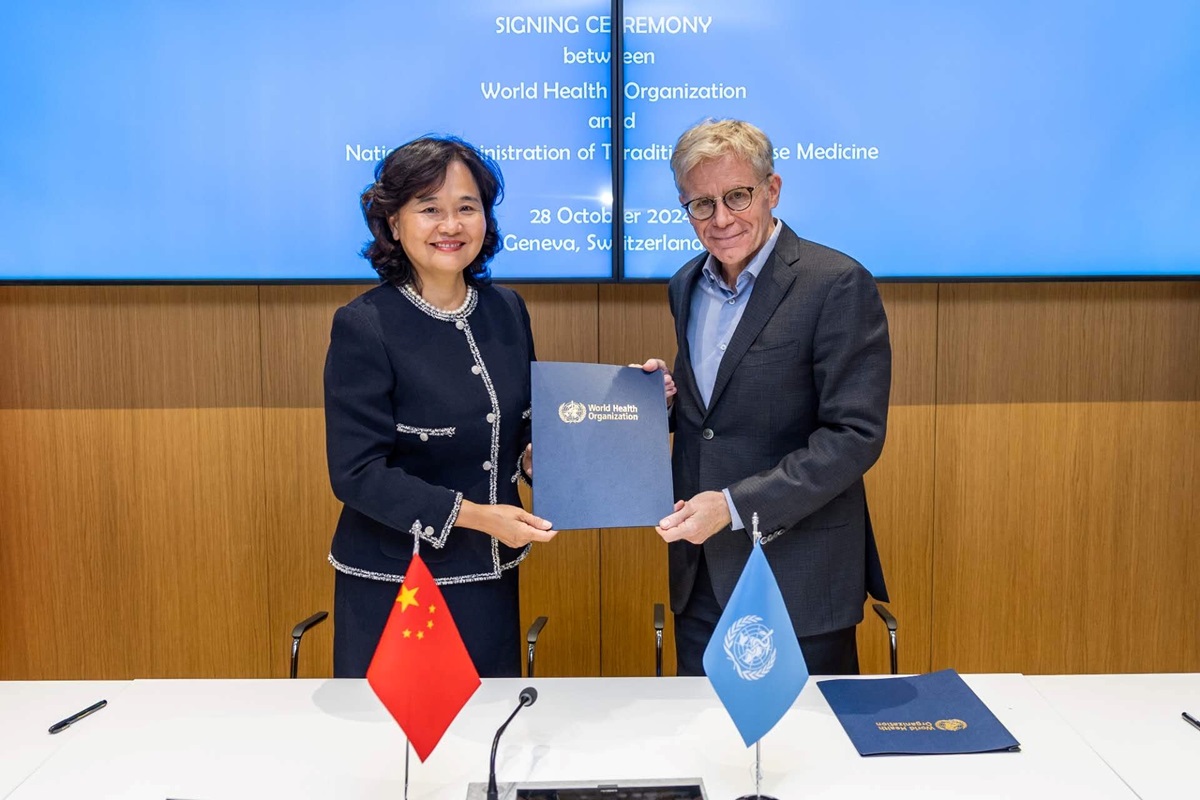
Worldwide, traditional medicine is used by billions of people for their health and well-being. At a signing ceremony in Geneva, the Government of China committed US$ 5 million over 5 years (2024–2028) to support the World Health Organization’s (WHO) Traditional, Complementary, and Integrative Medicine (TCIM) programme. This financial commitment will also play an important role in advancing the WHO Traditional Medicine Strategy 2025–2034, which is anticipated to launch at the Seventy-eighth World Health Assembly in May 2025. /integrated-health-services-(ihs)/traditional-complementary-and-integrative-medicine-(tci)/moue143856e-36c2-4e5f-b0d5-661ded3ba9ac.jpg?sfvrsn=2474f12_6)
China’s support for traditional medicine has been expressed through a variety of longstanding partnerships with WHO, including the Project Collaboration Agreement signed in 2013 and the memorandum of understanding (MoU) signed in 2018. The signing of the new MoU continues the successful collaboration between WHO and National Administration of Traditional Chinese Medicine (NATCM) in the Government of China and will further enhance research capacity, establish norms and standards for safety and quality, promote appropriate regulation for TCIM, explore the integration of TCIM into health systems, and foster international cooperation in the field of traditional medicine.
“China’s leadership and commitment to advancing scientific understanding of the safety and effectiveness of Chinese traditional medicine, as well as improving the accessibility and quality of these services within its national health system, are commendable,” said Dr Bruce Aylward, Assistant Director-General of the Universal Health Coverage and Life Course division at WHO. “When effectively integrated within national health systems and adapted to local contexts, traditional medicine can play a significant role in achieving universal health coverage,” he added.
Professor Yu Yanhong, Commissioner of the National Administration of Traditional Chinese Medicine (NATCM) of China, remarked, “NATCM solemnly promises to continue intensifying efforts to share experiences in the field of traditional medicine with a view to address global health challenges, enhance self-management capabilities, and contribute positively to building a health and well-being of individual and society.”
Ms Li Weiwei, Minister Counselor of the Permanent Mission of the People’s Republic of China to the United Nations Office at Geneva and other International Organizations in Switzerland, added, “China remains committed to supporting WHO’s efforts to strengthen traditional medicine systems globally. The Permanent Mission of China will continue to foster collaboration between WHO and NATCM, playing an active role in promoting this partnership.”
WHO’s Traditional, Complementary and Integrative Medicine (TCI) unit is focusing on setting global strategic directions through the Global Traditional Medicine Strategy, monitoring trends in TCI through global surveys, establishing norms and standards through training and practice benchmarks, and advancing terminology standardization. The unit is developing evidence-based technical products to support the safe and effective integration of traditional medicine in national health systems through various activities and programmes.
WHO will continue to work to ensure that traditional medicine is recognized and integrated into health systems globally through the work of the TCI unit and the WHO Global Traditional Medicines Centre (GTMC). The GTMC promotes knowledge-sharing and innovation to harness the potential of traditional medicine for help improve health for all.
Related
Traditional, Complementary and Integrative Medicine (TCI)
